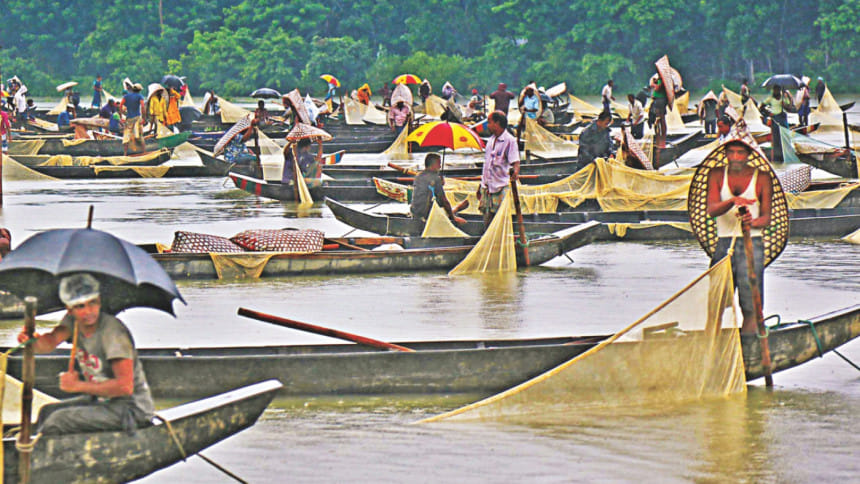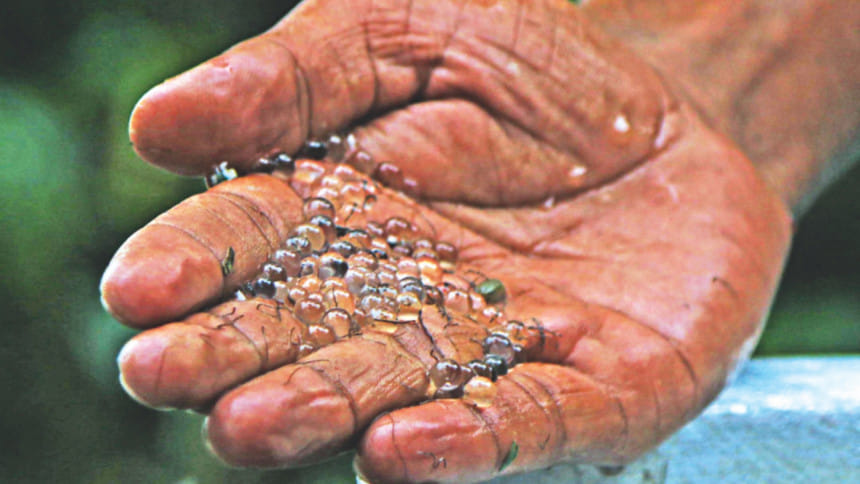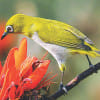Poor catches disappoint fishermen

Several hundred fishermen yesterday went back home with poor catches of eggs from the Halda river, the largest and lone natural spawning ground for carp fish in the country.
Around 250 boats were ready to collect spawn at Madunaghat, Azimer Ghona, Urirchar, Madarasha, Khalifer Ghona, Garduara and Napiter Ghona areas of Hathazari and Raojan upazilas but the fishermen could collect only a small amount of spawn.
"With high hopes, we went down the river taking our boats and nets, but it was a big disappointment. The fish laid a small amount of eggs," said Kamal Uddin Sawdagor, a fisherman of Garduara area.
He said he collected only a bucketful yesterday.
Hares Shah, another fisherman of Madrasa area, said the Halda was a safe haven for carp fishes once and mother fishes used to release eggs on time at certain points of the river.
"As the river is being polluted, fishes are now releasing eggs in a small scale," he said, adding, "Mother fishes do not feel the river to be safe for releasing spawn."
Hares said he collected around 700 grams of spawn yesterday.
According to experts, different natural factors like temperature of water, strong current, adequate rainfall and thunder shower create a congenial atmosphere for mother fishes to release eggs.
Although there was a heavy downpour in Chittagong on Wednesday, the indigenous fish released a small amount of eggs yesterday, which experts termed "sample spawns".
Halda expert Manzoorul Kibria said the mother fish release eggs between Baishakh and Ashar (April and June) every year and fishermen collect those immediately.
This year the indigenous fishes released sample spawns on April 8 and on April 21, as the atmosphere was not favourable in those phases, he said.
But the atmosphere was congenial yesterday, yet the mother fishes did not release eggs in a large scale, he added.
"It is a matter of worry as to why the mother fishes just released sample spawn despite having all the favourable natural factors," he said.

Kibria, also an associate professor of zoology department at Chittagong University, said usually the mother fishes release sample eggs before releasing eggs in full. They do so to monitor whether the released eggs can survive.
Man-made hazards like cross-rubber dam on the river at Bhujpur and industrial waste were destroying the spawning ground and decreasing the production of eggs, he said.
"I have heard that Chittagong port has been advised to hoist a local warning signal today [yesterday] ... It's believed that mother fishes do not release eggs at the time of natural disasters," the Halda expert said.
Mohammad Ali, another Halda researcher, echoed Kibria. He too held environmental hazards and indiscriminate catching of mother fishes responsible for the decrease in the production of eggs.
Contacted, Sheikh Harunur Rashid, assistant met officer of Chittagong Met Office, said Chittagong Port was advised to hoist signal-4.
Manzoorul Kibria said, "The fishermen should not be frustrated as there is still time in this season for the mother fishes to release spawn in a large scale."

 For all latest news, follow The Daily Star's Google News channel.
For all latest news, follow The Daily Star's Google News channel. 








Comments